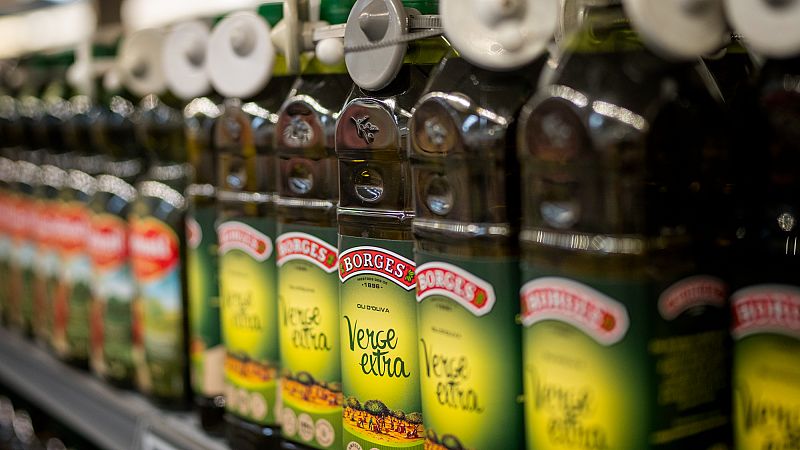Fact check: debunking viral claims about Spanish olive oil

A viral wave of disinformation targeting Spanish olive oil is shaking up the industry with claims that bottles labelled as ‘non-EU’ actually contain Moroccan olive oil.
However, while these claims are false, similar ones arguing that the Spanish government will recall olive oil products from the markets if the next harvest is too abundant are partially true.
Claims on social media are leading Spaniards to believe that their olive oil industry – which accounts for nearly 50% of global production and is vital to Spain’s economy, generating around €3.2 billion and supporting close to 42,000 jobs – is being hijacked and consumers tricked.
Since September 2023, a series of online videos have claimed that olive oil from the brands Carbonell, Hojiblanca, and Koipe is actually made with Moroccan olives. These claims were based on the bottles’ labels, which stated that the oil was crafted with olives “grown within and outside the EU.”
Users assumed this indicated Moroccan origin, despite zero evidence pointing towards it.
Deoleo, a multinational company that produces all three brands, has denied these claims and assured that “Morocco is not a supplier of olives” for any of its products.
Blending oils is standard practice in the industry and the bottles singled out in the videos came from the 2022-2023 campaign; at the time, because of a drought and extreme heatwave in Spain, Deoleo had to incorporate Chilean, Argentinian, and Tunisian oil into their products – hence the “outside of the EU” labelling. Still, none came from Morocco.
As of August 2025, all three brands are working exclusively with 100% Spanish olive oil. Moreover, since 2024, Carbonell bottles have included a QR code that allows customers to check the origin of the olives, the campaign, production locations, and packaging date.
Will olive oil be recalled from shelves?
Still, fears about difficulties in 2025–2026 are not entirely unfounded: the Spanish agriculture ministry has started the process to approve a ministerial order to allow limits on the sales of olive oil products if the coming harvest is too abundant. This means that some bottles of olive oil could be recalled from the market.
The order, which has not yet been approved, seeks to prevent a possible overproduction from causing a collapse in prices and market speculation.
This would ensure stability for both producers and consumers. It’s in line with European legislation: Article 167a of European Regulation (EU) No 1308/2013 allows member states to regulate the supply of olive oil. In Spain, this provision is implemented through Royal Decree 84/2021, which authorises the Ministry of Agriculture to carry out product withdrawal measures when necessary.
The news caused a wave of online uproar and viral misunderstandings, as many users assumed that olive oil products would be immediately withdrawn from supermarket shelves. This is false: the order would only apply under specific circumstances, and it has not yet been approved.
The order still needs to go through several stages before application, including consultations with Spain’s different autonomous communities and agricultural organisations. It must also respond to specific overproduction data, refer only to the 2025/2026 campaign, and be approved before 31 October. As of today, it already has the support of two big agricultural organisations: Spain’s COAG (the alliance of agricultural and livestock organizations), which argues that the measure will protect consumers by avoiding price hikes, and the UPA (the union of smallholder farmers and livestock producers), the union of small farmers.
If it does get approved and the withdrawal goes through, it would mean that part of the olive oil produced would be reserved for next year’s sale or be used for non-food-related purposes.
But how likely is this to happen? Even if the order is approved, it does not mean the olive oil will be withdrawn. The measure would only come into effect if overproduction is confirmed.
The 2024/2025 campaign saw normal levels of production after two previous weak ones. The 2025/2026 harvest is projected to exceed the previous average of 1.4 million tonnes of olives.
But COAG told Spanish fact-checker Maldita.es that it’s unlikely the measure will be applied, as the 2025 harvest is already lower than expected.
Today

